Confidentiality Agreement – Student Worker
All incoming students sign a "Student Worker Confidentiality Agreement" upon entering the college and before starting to work. This agreement defines and articulates the general workplace confidentiality standards the student worker must follow when handling or having access to sensitive and protected department records and communications. Labor Departments can choose to supplement this agreement with a department confidentiality agreement that is specific to the department’s work environment.
Berea College Student Worker Confidentiality Agreement
I, _________________________________________________, understand that in the performance of my assigned duties as a student worker at Berea College, I may at times have access to personal and department records. I agree to keep all such information completely confidential. By signing this document, I am agreeing not to share any information that I become aware of through conversation, actions, or through the viewing of personal and/or departmental records except as authorized by my supervisor.
The purpose of this agreement is to protect the privacy and identity of all parties and to avoid compromising the integrity of the department, all concerned individuals, and Berea College through the disclosure of confidential information.
I understand that to breach this confidentiality is a betrayal of trust and a serious offense which may result in my dismissal from the department and/or possible disciplinary action by Berea College.
****************************************
______________________________________________________________
Student Worker B#
______________________________________________________________
Student Name (Print)
______________________________________________________________
Student Worker Signature
Date:________________________________
Inclement Weather Plan - Labor Program
2 HOUR DELAY
Labor Program
Except for the following designated essential work areas, all student morning work schedules, until 10 AM, will be cancelled. Essential work areas will be required to develop/implement an inclement weather plan. The plan must include the designation of a student emergency crew - made up of select resident student managers (WLS 4-6) and resident student workers (WLS 1-4). In addition, all student work areas must plan and adjust student work schedules after 10 AM to accommodate the following academic class schedule changes. Labor supervisors are required to inform/share details of the plan with student workers.
Note: Any student assigned to an outside emergency crew (College Farms, Facilities Management-Grounds, and Public Safety) must have appropriate weather clothing/footwear.
- College Farms
- Child Development Lab
- Dining Services
- Facilities Management Grounds
- Facilities Management Housekeeping
- Public Safety
- Residential Halls
Academic Program
Classes starting after 5:00pm will meet as scheduled.
For a Monday/Wednesday/Friday 10:00 am start:
|
Typical Time of Class
|
Alternate Time
|
8:00-9:10 MWF
|
10:00 am-10:50 am
|
9:20-10:30 MWF
|
11:00 am-11:50 am |
10:40-11:50 MWF
|
12:00 pm-12:50 pm
|
12:00-1:10 MWF
|
1:00 pm-1:50 pm
|
1:20-2:30 MWF
|
2:00 pm-2:50 pm
|
2:40-3:50 MWF
|
3:00 pm-3:50 pm
|
4:00-5:10 MWF
|
No Change
|
Two-Hour Blocks |
|
| MW 8:00-9:50 |
10:00 am-11:50 am |
| MW 8:40-10:30 |
10:00 am-11:50 am |
| MW 12:40-2:30 |
1:30 pm-2:50 pm
|
MW 4:00-5:50
|
No Change
|
Three-Day Long Blocks |
|
8:00-9:50 MWF
|
10:00 am-11:50 am
|
10:40-12:30 MWF
|
12:00 pm-1:20 pm
|
2:40-4:30 MWF
|
3:00 pm-4:50 pm
|
ART |
|
9:00-11:50 MW
|
10:00 am-12:50 pm
|
2:40-5:30 MW
|
3:00 pm-5:50 pm
|
SCIENCE LABS
|
|
| 2:40-5:30 |
3:00 pm-5:50 pm
|
For a Tuesday or Thursday 10:00 am start:
Typical Time of Class
|
Alternate Time
|
Tuesday/Thursday 8:00-9:50
|
10:00 am-11:20 am
|
Tuesday/Thursday 10:00-11:50
|
11:30 am-12:50 pm
|
Tuesday/Thursday 1:00-2:50
|
No Change
|
| ART |
|
| 8:00-10:50 |
10:00 am-12:30 pm
|
| 9:00-11:50 |
10:00 am-12:30 pm
|
| 12:00-2:50 |
12:40 am-2:50 pm
|
SCIENCE LABS
|
|
| 8:00-11:00 |
10:00 am-12:30 pm
|
| 12:00-2:50 |
12:40 pm-2:50 pm
|
| 8:30-11:30 |
10:00 am-12:30 pm
|
-------------------------------------------------------------------------------------------------------------------------------
INCLEMENT WEATHER PLAN
LABOR PROGRAM
ENTIRE DAY
NON-ESSENTIAL WORK AND ACADEMIC CLASSES CANCELED
Labor Program
Except for the following designated essential work areas, student work schedules will be canceled for the entire day. However, any student assigned to a work area that is open for all or part of the day can, with the permission of the labor supervisor, choose to work.
Essential work areas will be required to develop/implement an inclement weather plan. The plan must include the designation of a student emergency crew - made up of select resident student managers (WLS 4-6) and resident student workers (WLS 1-4). Labor supervisors are required to inform/share details of the plan with student workers.
Note: Any student assigned to an outside emergency crew (College Farms, Facilities Management-Grounds, and Public Safety) must have the appropriate weather clothing/footwear.
- College Farms
- Dining Services
- Facilities Management Grounds
- Facilities Management Housekeeping
- Public Safety
- Residential Halls
Student Work and Meal Time Outs
A
paid fifteen (15) minute break is required for students working four (4) consecutive hours and an
unpaid thirty (30) minute meal break is required for students working at or beyond five (5) consecutive hours a day.
Dress and Hygiene
The Labor Program Office supports the establishment of dress requirements that are appropriate to the work performed in each department. Some positions may require mandatory use and wearing of appropriate safety protection (e.g., hard hats, safety shoes, chaps, goggles, etc.), hygiene materials (e.g., gloves, hair nets, etc.), and/or other work-specific items. The department is responsible for supplying or reimbursing expenses incurred by the student under the following conditions: if a uniform or uniform manner of dress is required, or if the use of safety protection, hygiene, and/or other work-specific items are required.
Departments that actively engage the public may establish reasonable standards of appearance and those standards should made very clear to first-year students during the position orientation and to upperclassmen during the interview and hiring process.
All students are expected to maintain a basic standard of hygiene and cleanliness, regardless of their position or department.
Department Work-Learning-Service Enrollment List
The Labor Program is recognized as an integral, recognized, and stated part of Berea’s educational philosophy and program. Accurate records of the student’s participation in the program are required to meet the institutional commitment, federal work college requirements, and SACS accreditation requirements.
Similar in ways to the verification of student attending an academic class, the list must be verified by the labor department as accurate. The list is sent to the Payment Coordinator of the labor department during the first pay period of the fall term and prior to the start of the spring term, and summer peirod. It is the responsibility of the labor department Payment Coordinator to work with the department Labor Supervisors to verify that the student workers are assigned to the correct Labor Supervisor, position, Work-Learning-Service (WLS) level, and hours per week. The data must be accurate to ensure that the student work record is correct in regard to the department and position assignment designation, labor supervisor designation, and the WLS level of the position. This is critical in ensuring accurate labor data is uploaded into the Labor Transcript (the permanent record of the student work assignments and performance).
Education Abroad- Probation
Students on labor probation are not permitted to register for and/or participate in instructional programs located abroad. All students registered for education abroad opportunities will be subject to a mid-term labor performance review, and those found to be significantly deficient in meeting the required labor obligation will not be allowed to participate. Any student placed on probation during, or at the end of the term, will not be allowed to participate in an education abroad even if already registered. Exceptions must be approved by the Dean of Labor. The full Education Abroad Policy is stated in the Student Handbook.
Essential Labor
Many labor departments depend upon their students to maintain minimal function. While departments are encouraged to release students from their duties for participation in college-wide events (Mountain Day, Martin Luther King Day, Exploring Labor, Service, and Learning Day), those with essential labor are not required to dismiss students altogether. Most departments can manage this situation through careful planning and distribution of student labor so that everyone can participate in some aspect of the event.
Students should not be scheduled to provide “coverage” so that staff can attend such events in their place. In rare cases, academic requirements are scheduled outside of normal class hours (e.g., General Education Writing Proficiency Exam for first-year students). Students are required to attend the half day College-Wide Symposium; therefore, labor departments should not schedule students to work during this time frame. In these cases, supervisors must adapt their schedules to provide for release. Course study sessions or extra credit assignments are not considered requirements for the purpose of labor dismissal, though supervisors are encouraged to be responsive to such requests whenever practical.
Essential labor may be defined as student labor that supports any college business or service that is open to the public (i.e., Boone Tavern, Bookstore, Log House Gift Shop, Seabury Center, Child Development Lab) or any area responsible for the health and welfare of the campus community and property (i.e., Food Service, Public Safety, College Farms, Facilities Management). Students assigned to areas defined as essential labor will operate on the same schedule as regular staff when weather related issues arise. If labor is dismissed, there will be an announcement campus wide.
Excused Hours
Students who are unable to report to a regularly scheduled work assignment due to an emergency are expected to notify their labor supervisor immediately. Special circumstances such as an excused absence due to a death in the family, or prolonged illness, should be communicated to the Labor Program Office to consider if the student may be excused from a portion of the labor requirement. This should be done as quickly as possible and before the end of the term as some circumstances may require documentation. In instances other than emergencies the labor supervisor should be notified well in advance of the absence and time should be made up before the end of the term.
Holidays and Days of Observance
The following policies have been set for days of observance, breaks and holidays on behalf of student labor:
Days of Observance
Mountain Day: Labor is dismissed unless it is essential to a department’s operation.
Exploring Labor, Service, and Learning Day: Labor is dismissed unless it is essential to a department’s operation.
Martin Luther King Jr.’s Birthday: Students work as usual but participation in events is encouraged
Holidays
Good Friday: Labor is dismissed unless it is essential to the department’s operation.
Memorial Day: Labor is dismissed unless it is essential to a department’s operation.
Independence Day: Labor is dismissed unless it is essential to a department’s operation.
Thanksgiving, Christmas and Spring Breaks: Labor is dismissed unless a department agreement is in place that specifics break responsibilities,
Other
Reading Period and Final Exams: Students work normal hours during college reading periods and “as arranged” during final exams week.
Exemption from Labor
Practica and Student Teaching
In recognition of increased demands related to workload, scheduling, and required travel, students may be exempted from labor for participation in the following experiences:
- Nursing Clinical (fall term of final year; students required to attend clinical on Tuesdays from 2:00 p.m. - 7:00 pm)
Students are responsible for finding a primary labor position that would not require them to participate in the Tuesday labor meeting.
- Nursing Clinical (four week summer term - students are exempted from labor)
- Nursing Practicum (NUR 349 and NUR 450, final spring term)
- Student Teaching (EDS 282, EDS 292 or EDS 296 final term)
Students participating in a nursing practicum or student teaching experience should complete a status form listing “0” hours, no labor and the reason under “department” and have a member of their faculty sign as the supervisor. Students should notify their labor supervisors in advance of hiring that they will have an exemption during this term, as some departments may not be able to support a mid-year release.
Although not required, students may elect to work on campus while participating in these experiences. Students should complete the process above for a primary exemption and then secure a secondary status form for the desired number of hours (the work is performed in a primary manner, but our scholarship payment system records the hours as a secondary labor assignment so that the hours are recorded as optional and not required).
Off-Campus Experiences
In recognition of the comprehensiveness of these experiences, students may be exempted from labor for participation in summer domestic travel courses and internships. Exceptions include cases where a student will spend a significant amount of time (i.e., more than a few days) off campus. These exceptions are addressed on a case-by-case basis through the Labor Program Office. Note: Student engaged in a summer study abroad course are exempted from working in the labor program.
Grievance Procedure
A student with a labor-related problem should first discuss this situation with the supervisor. Most difficulties can be handled at this level. However, if the situation cannot be solved here, the next step is to discuss the concern with the head of the department. If the concern is not resolved, the next step is to contact the Coordinator of the Labor Program for intervention and possible mediation.
If a solution cannot be reached in this manner, a formal grievance can be made by presenting the complaint in writing to the Dean of Labor. The Dean may request written responses from the other parties involved. Normally within one week from the time the written complaint is received the Dean will write a report of findings and conclusions and submit it to all concerned. If any of the parties to the grievance appeals the Dean’s decision, the Labor Program Council will convene a meeting, normally within one week of the appeal, or as soon as possible.
The Labor Program Council Chairperson shall appoint a Labor Grievance Board composed of the following: the Vice President for Labor and Student Life and four members of the Council, including the Chairperson, one student, one teaching faculty member, and one non-Labor Program Office member. The Labor Program Council Chairperson will serve as chairperson of the Grievance Board. The Dean of Labor will forward to the Board all written documents concerning the grievance and the written report. The Board will review the grievance and within one week give a written decision to all concerned. The decision of the Board will be final subject to legal and other institutional requirements as determined by the President.
-Adopted by the General Faculty, January 5, 1981
Grievances related to discrimination and sexual harassment will be addressed through other means. Please refer to the compliance section of this publication for further details.
Hour Requirement
All students sign a Labor Enrollment Agreement upon admission to Berea College. In signing the agreement, each student commits to:
- Working no less than ten (10) hours a week throughout the term and adhere to the work schedule required by the position and arranged with the supervisor.
- Completing a Status Form (labor position participation agreement) for each position held, or for any change in position, as a supplement to the Labor Enrollment Agreement and as approved by the Labor Program and Student Payment Office.
- Working all hours as defined by the status form(s) including adhering to the work schedule required by the position(s).
- Securing approval for continuously working more than fifteen (15) hours per week, as specified in the labor overload approval process.
The labor “Status Form” is the “Labor Position Participation Agreement” between the student worker and the labor department and establishes the work status of a student for a set period of time. The form defines the labor department position, the WLS level, and, the hours per week (academic term) or hours per day (summer practicum). A chart indicating the “Total Target Hours” based on primary 10-, 12- and 15 hour-per-week positions during an academic term (fall/spring and summer) is provided on the Labor Program website.
Labor supervisors work with students to develop a schedule that provides the hours needed to meet the weekly hour target, thereby meeting the term hour requirement as well. The Labor Program and Student Payments Office sets the target hours for each scholarship payment period, which are printed, posted on our website, and available on the BONd scholarship payment summary. A student who meets the target hours for each scholarship payment period will have successfully worked the total required hours assigned to the position by the end of the term. Students are responsible for monitoring their total hours worked and have access to this information in real time through TRACY UltraTime – See below: Student-Verifying Total Hours Worked. In addition, the student can review the total hours paid to date by reviewing the past check stubs received for a term or summer period. The Labor Supervisor can also view any student’s worker’s hours worked to date – see below Supervisor- Verifying Student Hours Worked.
If necessary and appropriate, the Labor Program and Student Payments Office may adjust the hour requirement during the academic term if extenuating circumstances prohibited all students from meeting the hourly requirement. Typically, these situations involve adverse weather conditions, utility issues, etc.
Student- Verifying Total Hours Worked
– displays total hours worked to-date during a Fall or Spring Term, or Summer Period.
Note: A summer period does not include a term target – term target is only used during the Fall or Spring term.
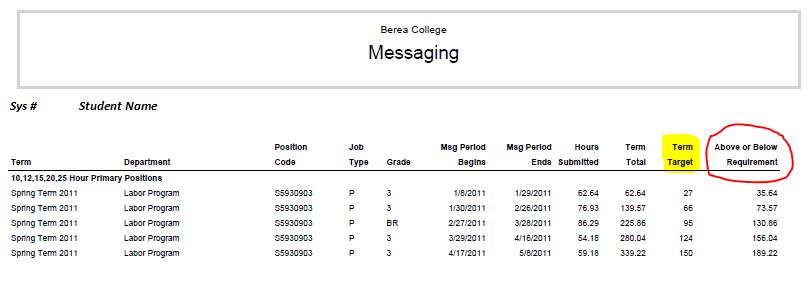
THE STUDENT TO ACCESS THE REPORT MUST DO THE FOLLOWING:
STEP 1: Opened the myBerea Portal and select the Labor tab:
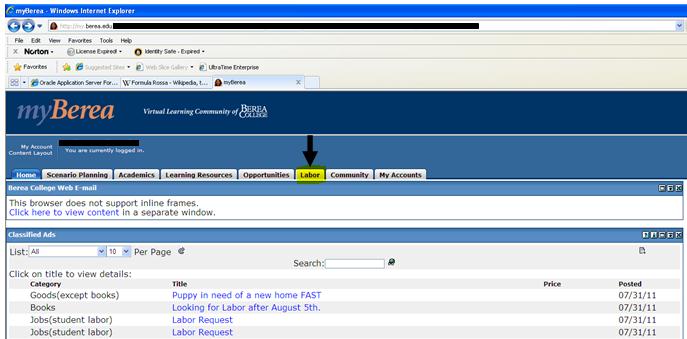
STEP 2: On Labor tab select View My Time Sheet
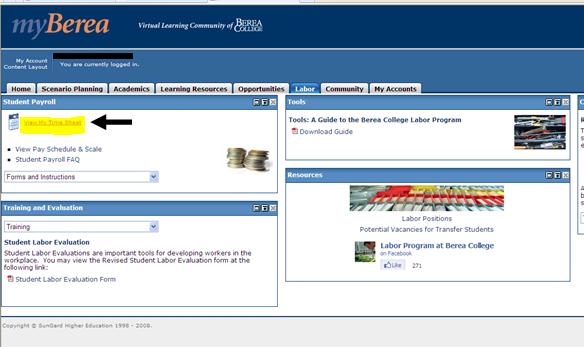
STEP 3: Select Calendar on the UltraTime window

STEP 4: Select under Print the Messaging Report
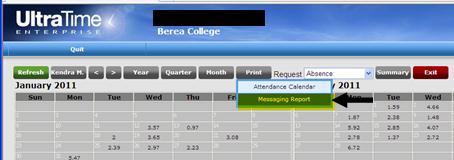
Supervisor Verifying Student Hours Worked
– displays total hours worked to-date during a Fall or Spring Term , or Summer Period ** .
* Payment Coordinator can also access using the same steps.
** Summer Period does not include term target.
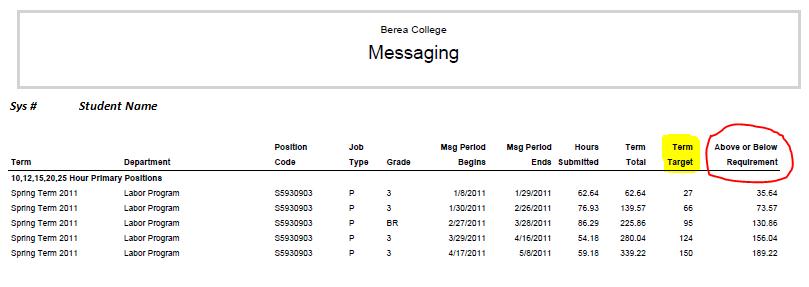
THE SUPERVISOR or PAYMENT COORDINATOR TO ACCESS THE REPORT MUST DO THE FOLLOWING:
STEP 1: Open Tracy UltraTime and select reports
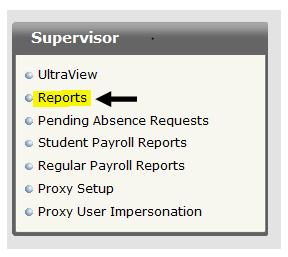
STEP 2: Select Miscellaneous Report Menu
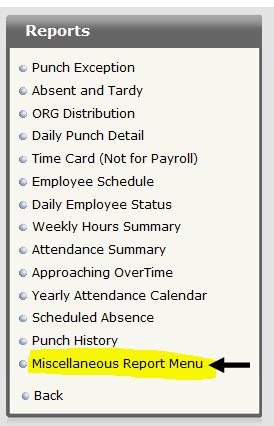
STEP 3: Select Miscellaneous Report Menu
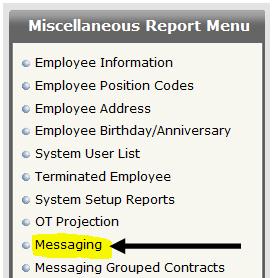
STEP 4: Select a Term
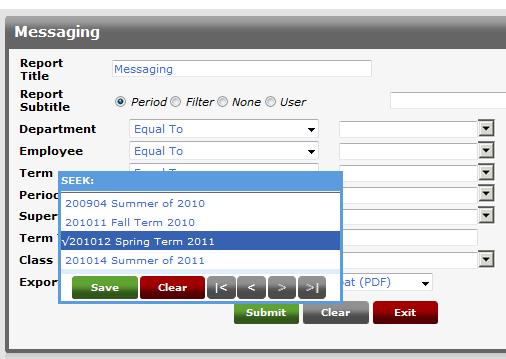
STEP 5: Select all of the pay period end dates that have occurred for the term or summer period and include the end date for the present pay period within the term or summer period.
Note: Payment period end dates for the present payment term or period (Fall or Spring term or summer period) can be accessed by going to the Labor Program Office Home site and selecting Payment Schedule and WLS rates.
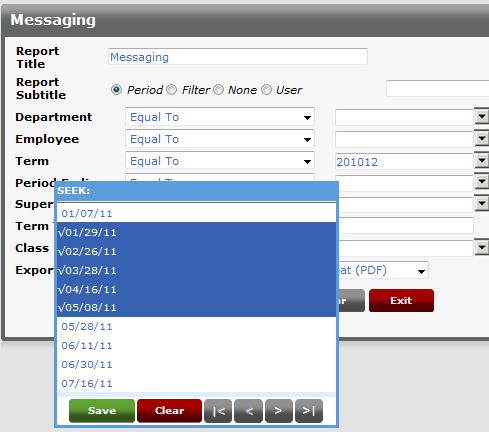
STEP 6: Select the student name(s) or you can select the dept which will display reports on all of the students in that department.
Note: You will only have access to the records of students under your supervision or if you are the Payment Coordinator access to all of the student records in that department.
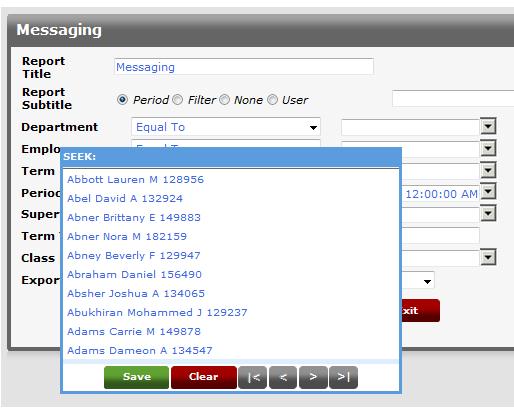
OR
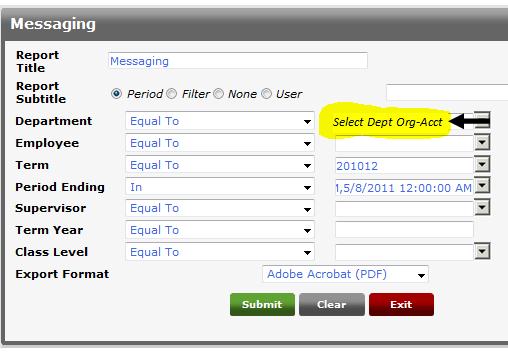
STEP 7: Select SUBMIT and the report will appear.
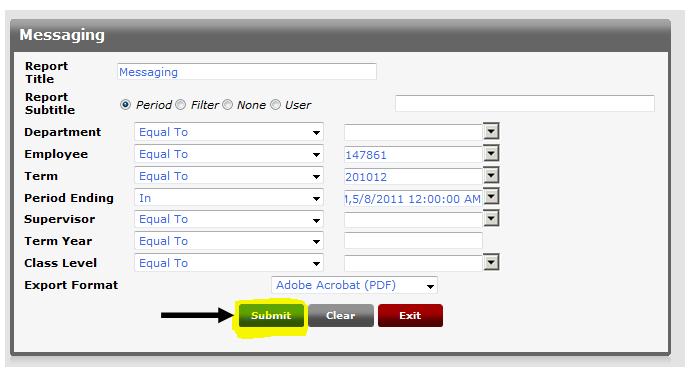
International Students (F-1 Status)
Hour Limitation
Labor Positions, during the academic year, are limited to no more than 20 hours per week. Students may work full-time during vacation periods as long as they have maintained status and have registered for the following academic term.
Work During Breaks and Summer
The College recognizes that it is often critical for international students to work during break periods and during the summer to maintain enrollment status and to supplement regular earnings. While we send early notification of vacancies and offer to assist students in locating positions, it is ultimately the individual’s responsibility to avail themselves of these resources and begin seeking a labor position as soon as possible. Opportunities are limited, and the College does not guarantee work during these periods.
Income Tax
Tips earned year-round at Boone Tavern are subject to federal income tax withholding. A student whose country of origin has a tax treaty with the United States is exempt from income tax according to the terms of the treaty and must complete the tax exemption Federal form.
Off-Campus Work
All F-1 international students arrive at Berea College having agreed to certain non-negotiable conditions imposed by the U. S. Department of Homeland Security, Student and Exchange Visitor Program. Among the restrictions associated with enrollment is that F-1 students must not work off-campus without prior authorization. While there are some opportunities for international students to work off-campus while enrolled, unless that work qualifies under the clearly articulated rubrics of Optional Practical Training (OPT) or Curricular Practical Training (CPT), participation places a student out of F-1 visa status which is a serious violation and means they can no longer remain enrolled and should leave the United States immediately. Both processes for legal work authorization are simple and straightforward for the student to follow.
Note: It is not permissible to compensate international students for casual jobs such as house cleaning, babysitting, yard work, tutoring, etc. These are specific examples of the sort of off-campus work that violates the conditions of enrollment for international students.
Curricular Practical Training (CPT)
An F– 1 student may be authorized by the International Student Adviser to participate in a curricular practical training program that is an integral part of an established curriculum. Curricular practical training is defined to be alternative work/study, internship, cooperative education, or any other type of required internship or practicum that is offered by sponsoring employers through cooperative agreements with the school. Students who have received one year or more of full time curricular practical training are ineligible for post-completion academic training. Exceptions to the one academic year requirement are provided for students enrolled in graduate studies that require immediate participation in curricular practical training. A request for authorization for curricular practical training must be made to the International Student Adviser. A student may begin curricular practical training only after receiving his or her Form I–20 with the DSO endorsement.
Optional Practical Training (OPT)
A student may apply for authorization for temporary employment for optional practical training directly related to the student’s major area of study. The student may not begin optional practical training until the date indicated on his or her employment authorization document, Form I–766 or Form 688B. A student may submit an application for authorization to engage in optional practical training up to 90 days prior to being enrolled for one full academic year, provided that the period of employment will not begin until after the completion of the full academic year as indicated by the International Student Adviser.
A student may be granted authorization to engage in temporary employment for optional practical training:
(1) During the student’s annual vacation and at other times when school is not in session, if the student is currently enrolled, and is eligible for registration and intends to register for the next term or session; (2) While school is in session, provided that practical training does not exceed 20 hours a week while school is in session; or (3) After completion of the course of study, or, for a student in a bachelor’s, master’s, or doctoral degree program, after completion of all course requirements for the degree (excluding thesis or equivalent). Continued enrollment, for the school’s administrative purposes, after all requirements for the degree have been met does not preclude eligibility for optional practical training. However, optional practical training must be requested prior to the completion of all course requirements for the degree or prior to the completion of the course of study. A student must complete all practical training within a 14-month period plus 17-months extension which equals 29 months following the completion of study. Please refer to the Center for International Education for further updates.
OPT is coordinated through the International Student Adviser; the Berea College OPT fund, administered by the International Student Adviser, covers the cost of application, pictures and mailing.
Labor File
Files are maintained on each student in the Labor Program and Student Payments Office. Materials include performance evaluations, disciplinary documentation, honors and recognition, scholarship payment forms, other official correspondence, and the Labor Transcript. Files are also stored electronically using NOLIJ document imaging software.
Labor Overload
A labor overload is defined as more than 15 hours of labor per week during the regular academic year. Overloads may not be approved retroactively and are subject to periodic review. Approval may be revoked if primary labor hours, labor performance, or academic performance become less than satisfactory. Forms may be secured in the Student Service Center, or Labor Program and Student Payments Office, and should be submitted to Financial Aid for preliminary review. Labor overloads may be continued from term to term within an academic year, provided that the approval guidelines can still be met. Student records will be reviewed mid-year and students will be notified if the overload is discontinued.
Guidelines for Approval:
- Sophomore, junior, or senior classification
- Meeting Labor Program requirements in the primary position
- Not on any form of probation
- Enrolled in less than 5 course credits with less than 8 preparations (fall and spring terms only)
- Have a 2.50 GPA, both cumulative and for the previous full term; the required 2.50 cumulative GPA may be waived if a 3.00 GPA is earned during the previous full term.
Requests for over 20 hours are subject to the following additional guidelines:
- Junior or senior classification
- 3.00 GPA in the major, overall, and for the previous term
- Submission of a letter outlining the reason for requesting more than 20 hours
- Approval of the Dean of Labor and the Student Admissions and Academic Standing Committee.
These approval guidelines may be waived in cases where student parents must work 20 hours per week in order to receive state childcare benefits (e.g., KTAP), but the application must still be submitted and reviewed.
During periods of non-enrollment (vacation periods, summer practicum), hours must not exceed 40 per week.
Maternity Leave
While the Labor Program doesn't have provisions for paid maternity leave, students who provide appropriate medical documentation can have some hours waived for the term based on their physician's recommendation. As well, the Labor Program understands child care facilities do not accept newborns until a period of time has elapsed. Student parents will not be penalized for circumstances beyond their control.
Student parents are advised to contact the Labor Program and Student Payments Office directly to discuss their situation on an individual basis.
Non-Degree, Part-Time and Exchange Students
Not all Berea College students are full-time degree-seekers. Students enrolled in the non-degree program are taking classes for personal fulfillment, part-time students are enrolled in less than three (3) course credits, and exchange students are sponsored by other programs to study at Berea for a year or less.
Even though they are not seeking a degree from Berea College, exchange students are expected to fully participate in every aspect of campus life. As such, they are subject to all requirements of the Labor Program while enrolled.
As degree-seeking students, part-time students are required to participate in the Labor Program, but a reduction in hours may be approved by the Dean of Labor depending on the circumstances.
Provided funding is available and all degree-seeking students have a labor assignment, non-degree students may be permitted to participate in the College’s Labor Program with the permission of the Dean of Labor.
Students who have graduated are not eligible to participate in the Labor Program and must seek employment via People Services. If students have any questions, they should contact the Labor Program and Student Payments Office located in the basement of Fairchild Hall, room 10 or call (859) 985-3611.
Off-Campus Labor (Non-College)
Academic studies and work through the Labor Program are the primary concerns of students attending Berea College and constitute a full-time load. Accordingly, work outside the Labor Program on a regular basis while enrolled as a student is not permitted without the approval of the Dean of Labor or his designate in consultation with appropriate academic and financial aid officials. In addition to compromising regular academic and labor requirements, off-campus work can seriously impact a student’s financial aid award. Requests for off-campus labor should be directed to the Labor Program Office.
Participation in Athletics and Performance-Based Co-Curricular Activities
Many students have significant co-curricular activities that present scheduling challenges. When the Labor Program Office selects position assignments for entering students, we take into consideration co-curricular activities and look for assignments with flexible scheduling or daytime scheduling in order to minimize conflicts for the students and the labor departments. When a student interviews for a labor position, they should inform the prospective supervisor about their schedules to determine if their activities can be accommodated. Students should always inform their supervisors in advance of upcoming events so that accommodations can be discussed. The Labor Program Office encourages scheduling accommodations for College-sponsored activities that are rigidly scheduled and dependent upon each student’s participation (e.g., intercollegiate athletics, theatre performances); however, students must recognize that co-curricular activities do not take precedence over labor requirements. Conflicts that cannot be resolved internally should be directed to the Labor Program Office.
Last Day to Release from a Labor Position
Signing a primary position status form obligates a student to remain in a labor position for the entire academic year, summer term or summer period, and, in the case of a spring admit or December graduate a spring or fall term. Should a student holding a Sophomore-Senior classification petition for an early release within a fall or spring term, due to special circumstances, the labor supervisor of the primary position may consider and approve the request for a release on or before the “Last Day to Change a Labor Position. (This date occurs one week after the first day of class in any term. Please refer to the academic calendar or labor calendar for the official date.)
Primary supervisors are not obligated to approve a student request for release. Rare exceptions may be considered after this deadline and will require approval from the Labor Program Office. The current primary supervisor must complete a “Labor Release / Position Adjustment Form” and submit it to the Labor Program Office, Fairchild Hall, Room 10 for review.
Note: First Year Students are assigned to a labor position for an entire academic year and may not be released from any position without approval from the Labor Program Office.
Performance-Related Release - Disciplinary Action Form
Students should not be dismissed arbitrarily. When a student’s performance does not meet department expectations, the supervisor should address and document performance issues using the Labor Program’s Student Disciplinary Action Form. A student cannot receive any type of department probationary status or release without using the Student Disciplinary Action Form except in grievous performance issues (e.g. falsification of time, serious confidentially cases, physical violent, etc.). Once the student has received three write-ups, the supervisor must consult with the Labor Program Office and determine the next course of action which may involve departmental probation, establishing an Accountability Agreement, and/or releasing the student, etc. In such cases, the Labor Program Office should be informed so that an appropriate placement can be determined. If a performance-related release is necessary, the Labor Program can assist the supervisor to ensure sufficient and appropriate documentation has been submitted to justify the release. Performance-related releases involving first-year students must be approved by the Labor Program Office.
Secondary Positions
Secondary positions are elective and hours are not counted toward the minimum hour requirement. As such, supervisors and students are not bound to any specific time period. However, students should take their secondary commitments very seriously, as many labor supervisors depend upon secondary students to accomplish their work. Students who fail to honor their secondary commitments may receive negative feedback from supervisors for inclusion on the Student Labor Evaluation.
The student must have a Labor Status Form signed by both the primary and secondary supervisors prior to submission to the Labor Program and Student Payments Office. The primary supervisor can elect not to sign-off on a secondary assignment if the student is not meeting require expectations within the primary labor assignment – e.g. schedule, hours, or performance. In addition, the Labor Program office can rescind the secondary labor assignment in cases where a student falls significantly or repeatedly behind in meeting the primary position performance obligations or hour target.
Students should not begin working a secondary position until all necessary paperwork and approvals has been completed. For instance, if a secondary position would put a student into an overload situation – the Labor Overload process must be completed and approved prior to submitting a secondary Labor Status Form to the Labor Program and Student Payments Office. If a student fails to submitted the appropriate paperwork, the secondary labor assignment can be terminated by the Labor Program and Student Payments Office.
Scheduling
Work schedules are based on student availability and department needs. Work hours vary widely across campus, and departments may have rotating schedules or one schedule that lasts the full term. There are no standards for scheduling except that work hours cannot conflict with class times or other class requirements (e.g., field trips). In the latter case, students are expected to provide advance notice so that accommodations can be made. Supervisors are not required to excuse labor for optional activities (e.g., study sessions) or for class preparation. These issues can be addressed through effective time management.
Supervisors are encouraged to schedule students for more than the minimum number of hours required each week (e.g., 11 hours for a 10-hour assignment, 13 hours for a 12-hour assignment, etc.); this provides a cushion for time that may be lost due to absences or travel time between work and classes. In some departments, students may be scheduled for slightly more than the required hours one week and slightly less the next; this is acceptable provided that the fluctuation is not excessive. The scholarship payment schedule indicates the number of hours a student should expect to work during each payment period to ensure fulfillment of the College labor requirement.
Students are to be paid for actual hours worked, not hours appearing on a schedule. Continuing student can be required and scheduled to work and/or attend training/orientation sessions the day before the start of Fall classes – “Continuing Student Arrive” day (see the academic calendar for official date). . Upper-class students can be required to work Thanksgiving, Christmas, or Spring break periods if this obligation is articulated and noted on or before signing a Status Form – Position Participation Agreement. While they may choose to do so, first-year students should not be required to work during the Thanksgiving, Christmas, or Spring break periods
Students are expected to work during the final exam period, though exam times may necessitate a change in scheduled hours. Final examination times are determined well in advance, so students and supervisors have ample time to work out alternate arrangements. If a student is scheduled for more than three exams on one day, there is a provision for re-scheduling an exam through the Office of Academic Services.
Special Needs
Students with long-term special needs (e.g., mobility limitations, visual impairment) are encouraged to share this information with the Therapist and Disability Services so that accommodations can be considered. This individual will work with the Labor Program Office to locate suitable first-year and subsequent labor assignments as needed.
Short-term special needs (e.g., broken leg) or minor health issues (e.g., allergies) can often be accommodated within the existing labor assignment by placing the student on light duty or adapting work requirements. In cases where this is not possible, students should consult the Labor Program Office directly for assistance in locating an alternate placement.
Summer
General Guidelines: Summer School and Summer Practicum
Degree seeking students enrolled in summer school are required to work at least 10 hours per week. Summer Practicum students are on campus to work, usually 40 hours. The emphasis of a summer practicum is on work and the learning outcomes (transferable and specific) that are derived from engaging in a practical educational experience. All students participating in the Labor Program during the summer are paid a standard rate of $7.75 per hour. The following chart describes labor options during the summer:
|
Term
|
Course Credit
|
# of weeks
|
Minimum Hours Reuirement
|
Maximum Hours Allowance
|
Scholarship Payment Rate
|
|
Summer School
(4 week session)
|
1-1.5*
|
4
|
10 per week
|
20 per week
|
$7.75
|
|
Summer School
(8 week session)
|
Up to 1.5
|
8
|
10 per week
|
40 per week
|
$7.75
|
|
2.5
|
8
|
10 per week
|
20 per week
|
$7.75
|
|
Summer Practicum
|
|
Up to 13
|
10 per week
|
40 per week
|
$7.75
|
*Implies registration in an 8 week ¼ credit course
Important to Note:
- All students are required to work at least 10 hours a week
- In order to employ students during the summer, labor departments must have allocated hours.
- Fees are assigned when a student is enrolled in summer school or in the summer practicum.
Graduating Seniors
Students who are taking a summer course to satisfy a September graduation requirement are not eligible for a summer practicum or working more than 20 hours a week while enrolled in the summer class. Summer school labor will be provided for the duration of the course. Graduating seniors are not eligible to work beyond the last day of class.
Summer Practicum Reassignment
Supervisors depend upon summer practicum workers for summer assistance and are unlikely to replace students after the summer has begun. As such, students are encouraged to take their commitments seriously and to inform supervisors of all summer plans (including class plans) prior to accepting a position so that it can be factored into the hiring decision. If a student leaves a summer practicum position under negative circumstances (e.g., does not fulfill his / her commitment, does not perform satisfactorily) the College reserves the right to deny the student the opportunity to secure another summer practicum position. As well, supervisors may submit a Student Labor Evaluation documenting the negative work performance. Even in cases of mutual release, students are expected to provide a two-week notice to the supervisor.
Summer Off-Campus Internship Funding
Students may be able to secure funding to work in their home or other communities during the summer. This funding not only allows students to maximize summer earnings by avoiding housing and transportation costs, but also allows them to give back to their communities through work and service. Funding is limited and summer internships for academic credit and those with non-profit government and service agencies are given priority. Once a student has identified an organization and secured an initial internship offer, the Internship Office will negotiate with the agency to contribute a portion- or in some cases all- of the hourly scholarship payment received through the payment process. Other considerations:
- Must be registered for the upcoming fall term
- Must not be registered for any class on-campus (no classes, unless the class registration is an internship)
- Cannot be on any type of probation
- Cannot be paid twice for the same position (e.g., funded through Bonner Scholars and the Labor Program)
- Must be processed as CPT for international students
- Normally a minimum of 8 weeks, maximum of 10 weeks
- Available for domestic experiences only
- Priority will be given to student seeking academic credit especially in federally recognized non-profit government and service agencies
If not for academic credit, the agency supervisor over the internship will be required to complete an evaluation of the student’s performance and the student will be required to complete the summer version of the Labor Experience Evaluation.
Working Before and After Enrollment
Students are not permitted to work in the Labor Program prior to enrollment. Students are not normally hired as regular workers if they have withdrawn from the College. The reason for this practice is to avoid a circumstance whereby the prospect of permanent employment would lead a student to discontinue his or her degree program. Exceptions may be considered by the Director of People Services in consultation with the Dean of Labor. Graduates are not normally hired during the first six months following degree completion to allow them time to pursue different experiences and environments- both professional and educational. Exceptions are made in cases that are clearly advantageous to the graduate and to the College.
Work During Break Periods
Some departments are allocated student labor hours for Thanksgiving, Christmas, and Spring break periods. Students who wish to work during a break should first consult their labor supervisor. If hours are unavailable, the Labor Program Office may assist in locating vacancies. Break hours are not guaranteed and are based on availability. Upper-class students may be expected to work during break periods as established upon hiring; first-year students may volunteer for break period labor, but they are not required to work.
All students who work during a break period must complete a new status form. The break rate is set at the WLS level 6 rate. For further information, please consult our website at http://www.berea.edu/laborprogramoffice/payschedule.asp.